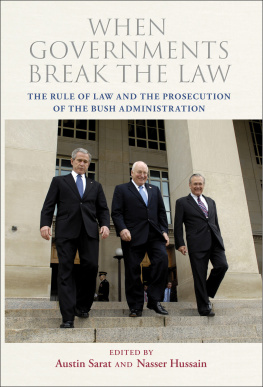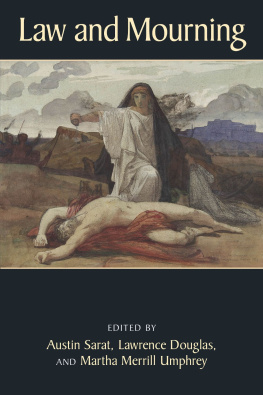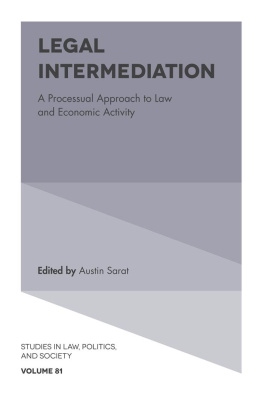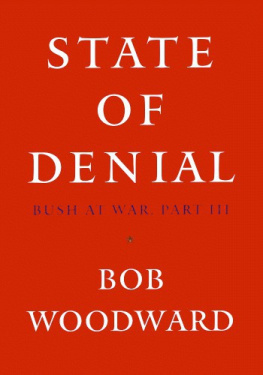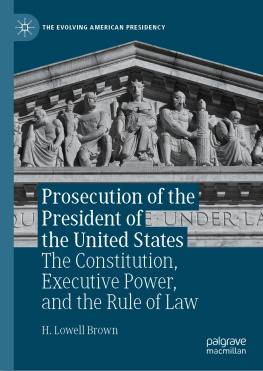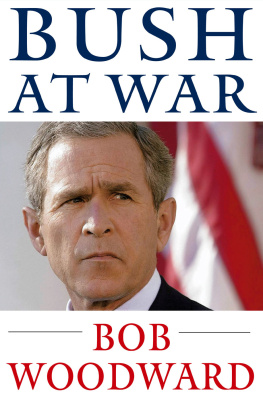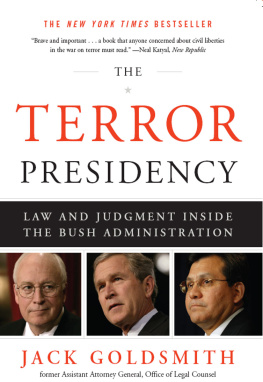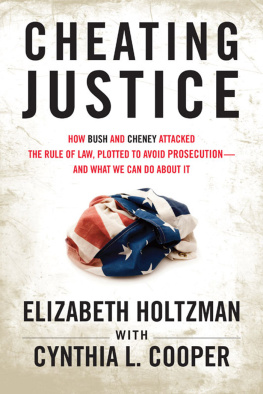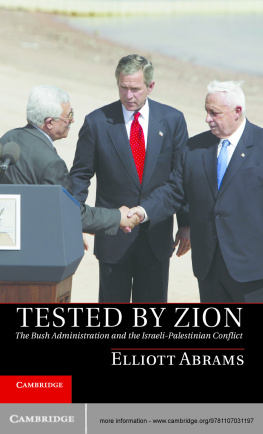Thank you for buying this ebook, published by NYU Press.
Sign up for our e-newsletters to receive information about forthcoming books, special discounts, and more!
Sign Up!
About NYU Press
A publisher of original scholarship since its founding in 1916, New York University Press Produces more than 100 new books each year, with a backlist of 3,000 titles in print. Working across the humanities and social sciences, NYU Press has award-winning lists in sociology, law, cultural and American studies, religion, American history, anthropology, politics, criminology, media and communication, literary studies, and psychology.
When Governments Break the Law
NEW YORK AND LONDON
www.nyupress.org
2010 by New York University
All rights reserved
Library of Congress Cataloging-in-Publication Data
When governments break the law : the rule of law and the prosecution of
the Bush administration / edited by Austin Sarat and Nasser Hussain.
p. cm.
Includes bibliographical references and index.
ISBN-13: 9780814741399 (cl : alk. paper)
ISBN-10: 0814741398 (cl : alk. paper)
ISBN-13: 9780814739853 (pb : alk. paper)
ISBN-10: 0814739857 (pb : alk. paper) [etc.]
1. War on Terrorism, 20012009. 2. Rule of law. 3. Administrative responsibility.
4. International offenses. 5. United StatesPolitics and government2001-2009.
6. TerrorismPreventionLaw and legislationUnited States. I. Sarat, Austin.
II. Hussain, Nasser, 1965
KZ6795.T47W48 2010
340.115dc22 2010015386
New York University Press books are printed on acid-free paper, and their binding materials are chosen for strength and durability. We strive to use environmentally responsible suppliers and materials to the greatest extent possible in publishing our books.
Manufactured in the United States of America
c 10 9 8 7 6 5 4 3 2 1
p 10 9 8 7 6 5 4 3 2 1
Introduction
Responding to Government Lawlessness:
What Does the Rule of Law Require?
NASSER HUSSAIN AND AUSTIN SARAT
Decency, security, and liberty alike demand that government officials shall be subjected to the same rules of conduct that are commands to the citizen. The government is the potent omnipresent teacher. For good or ill it teaches the whole people by its example. Crime is contagious. If the government becomes a lawbreaker, it breeds contempt for law; it invites every man to become a law unto himself; it invites anarchy.
Justice Louis Brandeis, Olmstead v. United States, 277 US 438, 485 (1928)
Accountability is the first step toward deterrence. With criminal offenses like this, it is necessary to send a clear message: No one is above the law, no matter their intentions. The security of any country can only exist within the rule of law. The war on terror is no exception.
Gonzalo Boy, Spanish lawyer working to indict
members of the Bush Administration,
interview with Mother Jones Magazine (2009)
Today, as in the past, Americans pride themselves on their commitment to the rule of law.
Recent controversies surrounding the war on terror and American intervention in Iraq and Afghanistan have brought rule of law rhetoric to a fevered pitch, with public officials and commentators uncritically linking it to Americas boundary-marking values and arguments about Americas distinctiveness. Typical was the statement of Jonathan Lippman, Chief Administrative Judge of the State of New York, who said, The rule of law is what separates us from those who seek to defeat our democratic institutions and way of life through violence and terror.
Similar invocations of the rule of law have framed the ongoing debate about prosecuting Bush Administration officials with regard to domestic surveillance, authorizing the use of torture, and falsifying the case for going to war. Thus Elaine Scarry argues that, If the country is to renew its commitment to the rule of law, that outcome will require reeducating ourselves about what the law is. The law aspires to symmetry across cases. The international rules against war crimes and torture do not allow prosecution to be thought of as discretionary; they do not allow an escape provision based on electoral euphoria or on ones doubts about ones own stamina in fighting injustice. So too the Convention against Torture requires that states submit
More urgently, some worry that without legal consequences there will be no effective deterrence for the repetition of such acts in the future. putting the past behind us means leaving the historical record muddied, acquiescing in criminal wrongdoing, and turning the rule of law into an empty slogan.
Yet while President Obama has repeatedly emphasized his administrations commitment to transparency and the rule of law, nowhere has this resolve been so quickly and severely tested than with the issue of the possible prosecution of Bush Administration officials. Before his inauguration, Obama asserted his belief that we need to look forward as opposed to looking backwards.
Even some critics of the Bush Administration agree with Obama that we should avoid such confrontations, that the price of political division and of a bitter fight that could cripple Obamas ability to achieve his priorities is too high.
New York Times columnist Thomas Friedmans op-ed piece, A Torturous Compromise provides one example of this kind of argument. alerts us to the difficulty of fashioning a narrow inquiry, and to how complex and far-ranging such an effort could quickly become.
But Friedmans main objection to prosecutions involves what he sees as a ruthless and murderous enemy, undeterred by normal means. Friedman here mixes familiar claims that emergencies require exceptions to the usual rules (an argument we will take up later) with a specific claim about the war on terror. So, yes, he admits, people among us who went over the line may go unpunished, because we still have enemies who respect no lines at all. In such an ugly war, you do your best.
The controversy surrounding the question of prosecution was vividly exemplified when Attorney General Eric Holder tasked a career prosecutor to investigate alleged CIA interrogation abuses, including episodes that resulted in prisoner deaths. Indeed Holder himself noted, I fully realize that my decision to commence this preliminary review will be controversial. However, he claimed that As Attorney General, my duty is to examine the facts and to follow the law. In this case, given all of the information currently available, it is clear to me that this review is the only responsible course of action for me to take.

